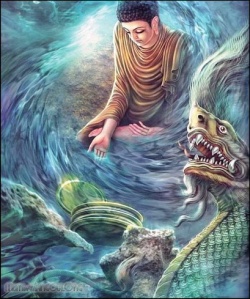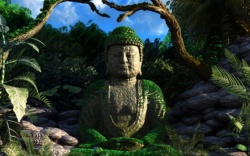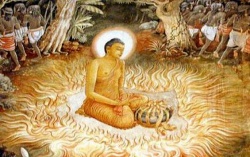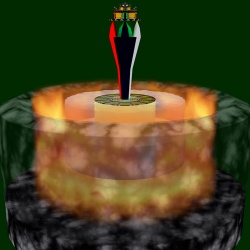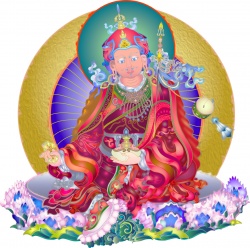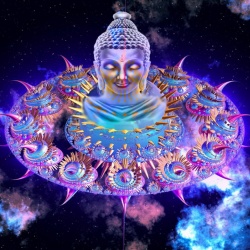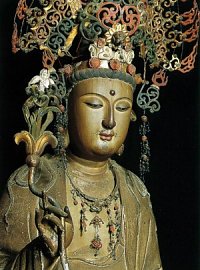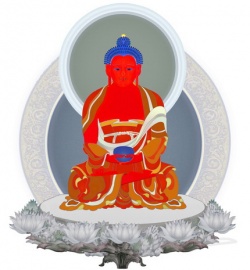Nirvana Sutra: Chapter Thirty-Six: On Bodhisattva Lion's Roar (d)
Mahayana Mahaparinirvana Sutra
Translated by KOSHO YAMAMOTO
FROM Dharmakshema's Chinese version
The World's genuinely first-ever web edition of this complete scripture
(This "Yamamoto/page edition" is Copyright of Dr. Tony Page, 2004 )
The Complete Kosho Yamamoto English Translation of the "Nirvana Sutra", edited and revised by Dr. Tony Page, typographically improved by Jay and Gabriele Mazo
Chapter Thirty-Six: On Bodhisattva Lion's Roar (d)
(The Buddha said:) "How does one practise samadhi (i.e. meditative absorption)? One truly does away with all the worldly samadhis. This is the bodilessness samadhi. Beings get an upside-down mind and wrongly call this Nirvana. Also, there are such samadhis as the boundless-mind samadhi, the pure-group samadhi, the worldlessness samadhi, the world-segregation samadhi, the world-nature samadhi, the skandha-samadhi, the thoughtlessness-non-thoughtlessness samadhi (which) indeed make beings acquire an upside-down mind and call such Nirvana. If one truly segregates one's own self from such samadhis, this is practising samadhi.
"How does one practise Wisdom? One thoroughly extirpates the evil views of the world. Beings all possess evil views. That is thinking that "matter" (form) is Self, and that this belongs to Self; that there is Self in matter and matter in Self; and it so goes with consciousness; that matter is the Self; that matter dies, but that the Self stays behind; that matter is the Self, and that when matter dies out, the Self dies out. And a certain person says: "The maker is the Self; the recipient is the Self." Also, a certain person says: "The doer is matter; the receiver is the Self." Also, a certain person says: "There is no doing and no receiving. A thing comes about by itself; it dies out by itself. Nothing is based on causal relations." Also, a certain person says: "There is no doing and no receiving. All is the work of Isvara (i.e. God)." Also, a certain person says: "There cannot be any doer or any receiver. All comes about according to the season." Also, a certain person says: "There are doers and receivers. The five elements beginning with the earth are the being." O good man! If anyone crushes such evil views, this is practising Wisdom.
"O good man! Practising sila (morality) is for the quietude of one's own body. Practising samadhi is for the quietude of one's mind; practising Wisdom is for crushing out doubt. To crush out doubt is to practise the Way. To practise the Way is to see the Buddha-Nature. To see the Buddha-Nature is to attain unsurpassed Enlightenment. To attain unsurpassed Enlightenment is to arrive at unsurpassed Great Nirvana. To arrive at Great Nirvana is to segregate all beings from birth and death, all defilements, all (worldly) existences, all realms, all truths of beings. To cut off (these) births and deaths and satya (truth; presumably "worldly truths") is to attain to the Eternal, Bliss, the Self and the Pure."
Lion's Roar said: "O World-Honoured One! If, as the Buddha says, birthlessness and deathlessness are Nirvana, life too is birthlessness and deathlessness. Why can we not say that this is Nirvana?"
"O good man! It is thus, it is thus. It is as you say. Although this life is birthlessness and deathlessness, there are beginnings and ends."
"O World-Honoured One! There is also no beginning and no end in this law of birth and death. If there is no beginning and end, this is eternal. The Eternal is Nirvana. Why do we not call birth and death Nirvana?"
"O good man! The law of this birth-and-death depends on causality. As there are causes and effects, we cannot call this Nirvana. Why not? Because the body of Nirvana has no cause and effect."
Lion's Roar said: "O World-Honoured One! Nirvana has cause and effect, as you the Buddha say:
"Through cause one gains birth in heaven;
Through cause is one born into the unfortunate realms;
Through cause does one attain Nirvana.
Thus, everything has a cause."
You, the Buddha, said to the bhiksus: "I shall now speak to the sramanas about the fruition of the Way. "Sramana" means nothing other than practising well sila (morality), samadhi, and Wisdom. The Way is the Noble Eightfold Path. The fruition of sramana practice is Nirvana." O World-Honoured One! Nirvana is thus. Is this not fruition (i.e. result)? How can you say that Nirvana has no cause and no fruition?"
"O good man! What I refer to as the cause of Nirvana is the so-called Buddha-Nature. The nature of the Buddha-Nature does not call forth Nirvana. That is why I say that there is no cause in Nirvana. As it truly crushes defilement, I say "great fruition". It does not come about by the "Way". Hence I say that there is no fruition. For this reason, Nirvana has no cause and no fruition."
Lion's Roar said: "O World-Honoured One! Is the Buddha-Nature of beings a thing of common possession or is it something individually possessed? If it is of common possession, all would have to gain it when one person gains it. O World-Honoured One! Twenty people have one enemy. If one falls out of the group, the remaining 19 may also mean to have no enemy. If the Buddha-Nature is thus, the remaining persons must gain it if one person gains it. If each has the Buddha-Nature, this is non-eternal. Why? The nature of beings is neither one nor two. We cannot say that all Buddhas are all-equal. Also, we cannot say that the Buddha is like the void."
The Buddha said: "O good man! The Buddha-Nature of beings is not-one and not-two. The equality spoken of regarding all Buddhas is like the Void. All beings possess it. Anybody who indeed practises the Noble Eightfold Path gains - one should know - a bright view. O good man! In the Himalayas, there is a grass called ninniku (Sanskrit “ksanti” = patience, forbearance). A cow fed on this will gain sarpirmanda (the tastiest and most healthful of milk products). It is the same with the Buddha-Nature of beings."
Lion's Roar said: "Is the ninniku grass, about which you the Buddha speak, one or many? If it is one, it will come to an end when the cow feeds on it. If many, how can you say that the Buddha-Nature is also like this? You, the Buddha, say that if one practises the Noble Eightfold Path, one will see the Buddha-Nature. But this is not so. Why not? If the Way is one, it must come to an end, as in the case of the ninniku grass. If it comes to an end, there is no further part left for others to practise. If the Way is many, how can we say that practice is perfected? And how can one speak of “sarvajnana” (omniscience)?"
The Buddha said: "O good man! (Suppose) there is a flat road. Beings walk (along it), and there is nothing to hinder their progress. There is in the middle of the road a tree, the shade of which is cool. The travellers make a stop here with their palanquin and take a rest. But there is always the shade of the tree here, and there is no difference. The shade does not die out, and no one takes it away. The road is the Holy Way, and the shade the Buddha-Nature.
"O good man! There is a great castle, which has only one gate. Many people come and go, and pass through it, without hindrance. And no one destroys it and takes it away. That is how matters stand.
"O good man! It is as with a bridge, which does not care who passes over it; there is no one there to obstruct (the way) or destroy (the bridge) or carry it off. O good man! For example, it is as with a good doctor, who cares all about illnesses. And there is no one who checks (him), either to allow him to cure (people) or forcing him to abandon this. It is the same with the Holy Way and the Buddha-Nature."
Lion's Roar said: "O good man! You put forward all (such) parables, which, however, do not apply Why not? If there is any person on the way before (i.e. up ahead, further on), that person must be hindering (obstructing) the way. How can one say that there is no hindrance? The same applies to the others. If the Holy Way and Buddha-Nature are thus, this, when one practises the Way, would cause hindrance to others."
The Buddha said: "O good man! What you say does not make sense. What is explained in parables regarding the Way refers only to a part, not to all. O good man! The way of the world has hindrances. This differs from others; none are equal. The Undefiled Way is not so. It is such that it enables beings to have no hindrance upon their way. All is the same and all-equal; there is no difference as to place, or this and that. Thus, the Right Way serves as the revealed cause for the Buddha-Nature of beings, and does not become the cause of birth. This is as in the case of a bright lamp that does indeed shine over all.
"O good man! All beings are chained to ignorant actions through causal relations. Do not say that if one is chained to the way of ignorance, there can be no more such. All beings are chained to the action of ignorance. That is why we say that the 12 links of interdependent arising work equal to all (apply equally to all). It is the same with the Undefiled, Right Way which all beings practise. All-equally, it does away with the defilements of beings and those of the four lives and all the ways of existence of all realms (in samsara). So, we say "equal". When one is Enlightened, there is no knowing and seeing of this and that. For this reason, we can well speak of “sarvajnana” (all-knowledge)."
Lion's Roar said: "All beings are not of one kind of body. There are devas (gods) and there are humans. And there are such others as those of the realms of the animals, the hungry pretas (ghosts), and hell. They are many, not one. How can we say that the Buddha-Nature can be one?"
The Buddha said: "O good man! For example, there is a man who adds poison to milk. Because of this, all (the milk products) up to sarpirmanda will contain poison. We do not call milk butter, and butter milk. The same applies to sarpirmanda. The name may change, but the nature of the poison is not lost. It will run across the five tastes of the milk all-equally. Even sarpirmanda, if taken, will kill a man. Just as poison is not placed in the sarpirmanda, so is it the case with the Buddha-Nature of beings. “One finds the Buddha-Nature of beings in the different bodies of the beings of the five realms. But the Buddha-Nature is always One, and there is No Change."
Lion's Roar said: "O World-Honoured One! There are six great castles in the sixteen great states (i.e. the Gangetic states or castle-towns in the days of the Buddha), namely: Sravasti, Saketa, Campa, Vaisali, Varanasi, and Rajagriha. These big castles are the biggest in the world. Why is it that the Tathagata leaves these places and intends to enter Nirvana in this far-out, evil, very ugly and small Kusinagara Castle?"
"O good man! Do not say that Kusinagara is a castle which is far-out, evil, a most ugly and small place. This castle is one adorned with wonders and virtues. Why? Because this is a place all Buddhas and Bodhisattvas have visited. O good man! Even the house of a humble person may be called "grand and perfect in virtue", worthy of the visit of a great king, should he happen to come past (and stay) there. O good man! (Imagine) a person who is seriously ill and who takes a dirty and mean medicine. His illness is cured, joy arises, and this medicine becomes the best and most wonderful (of medicines). He praises it and says that it has truly cured his illness.
"O good man! A man is in a ship on the great ocean. Of a sudden, the ship breaks up, and there is nothing to depend upon. The man catches hold of a corpse and reaches the other shore. Gaining the other shore, he is very happy and praises the corpse greatly, saying that he was fortunate to meet with this corpse and has safely gained peace. It is the same case with Kusinagara Castle, which all Buddhas and Bodhisattvas have visited. How could one say that it is a far-off, mean, narrow, and small castle?
"O good man! I call to mind that once, in far-ff days, as many kalpas back as there are sands to the river Ganges, there was a time called the “Suprabuddha” kalpa (age, aeon). At that time, there was a holy king called Kausika. Fully endowed with the Seven Treasures and 1,000 children, this king first made this castle. It measured 12 yojanas crosswise and lengthwise. It was adorned with the Seven Treasures. The soil was good. There were rivers here, the waters of which were pure and soft, and they tasted sweet. These were: Nairanjana, Airavati, Hiranyavati, Usmodaka , Vipasa. There were some 500 other such rivers. Both banks were fully grown with trees that had flowers and fruits - all fresh and pure. At that time, the life-span of the people was uncountable. Then, after the lapse of 100 years, the Chakravartin (mighty ruler) said: "Just as the Buddha says, all things are non-eternal. One who practises the ten good things does away with all such sorrows of the non-eternal." The people, on hearing this, all practised the ten good deeds. I, at that time, on hearing the name of the Buddha, practised the ten good deeds, meditated and aspired to unsurpassed Bodhi (Enlightenment). My mind having aspired, I also transferred this Dharma to innumerable and boundless (numbers of) beings and said that all things are non-eternal and subject to change and dissolution. Because of this, I now continue and say that all things are non-eternal, are those that change and dissolve, and that only the Buddha-Body is Eternal. I recall what I did by (way of) causal relations. That is why I have now come here and mean to enter Nirvana and wish to repay what I owe to this place. For this reason, I say in the sutra: "My relatives know how to repay what they owe me."
"Also, next, O good man! In days past, when the life-span of people was immeasurable, this castle was called Kusanagaravati (probably the same as Kusinagara) and measured 50 yojanas crosswise and lengthwise. At that time in Jambudvipa, people lived shoulder to shoulder and fowl flew thereabout. There lived a Chakravartin named Zenken (Sudarsana). He had the Seven Treasures and 1,000 children and was the king of the four lands. The first of his sons loved Wonderful Dharma and became a pratyekabuddha. Then, the Chakravartin saw that his crown prince was a pratyekabuddha, that his deportment was orderly, and that he was endowed with wonderful miraculous powers. On seeing this, he renounced his state, as though it were tears and spittle. He became a monk and lived here amidst the sal trees, and for 80,000 years he practised Loving-Kindness. The same applied for 80,000 years to (the practice of) Compassion, Sympathetic Joy, and Equanimity.
"O good man! If you should desire to know who that holy king, Zenken, was, then know that he was none other than I. That is why I now abide in the four laws, which are none but the samadhis. For this reason, “the Body of the Tathagata is the Eternal, Bliss, the Self, and the Pure”.
"O good man! Because of this, I am now in this Kusinagara, in this forest of sal trees, and abide in samadhi. O good man! I recall to mind, after innumerable years, a castle-town called Kapilavastu. In that castle, there lived a king called Suddhodana. His consort was called Maya. They had a prince, who was called Siddhartha. The prince, at that time, took no teachers. He sought the Way by himself and attained unsurpassed Bodhi. He had two disciples, Sariputra and Mahamaudgalyayana. The disciple who attended the prince was called Ananda. At that time, he, under the sal trees, delivered the sermon of the Great Nirvana Sutra. At that time, I was one of the congregation and was able to be a witness to that sermon. There, I was told that all beings had the Buddha-Nature. On hearing this, I was unmoved in Bodhi. Then, I took a vow: "If I attain Buddhahood in days to come, it shall be as now. I shall be a teacher to my father and mother and the land; the names of the disciples and attendants will also be so, just as things stand with the present World-Honoured One. Nothing will differ." That is why I am now here and am delivering this sermon of the Great Nirvana Sutra.
"O good man! When I first abandoned home life, but had not yet attained unsurpassed Enlightenment, Bimbisara sent a messenger to me and said: "If you, Prince Siddhartha, become a Chakravartin, I shall become your subject. But if you leave home and attain unsurpassed Enlightenment, please come to this Rajagriha, deliver sermons, save people and accept my offerings." I then accepted his invitation in silence.
"O good man! On attaining unsurpassed Enlightenment, I then decided to go to Kosala. At that time, by the river Nairanjana there lived a Brahmin, Kasyapa, who had 500 disciples and who, by this river, sought of me the unsurpassed Way. I specially wended my way there to speak (to him) of Dharma. Kasyapa said: "O Gautama! I am 120 years old. Many people in Magadha, and the ministers and Bimbisara, say that I have attained arhatship. If I give ear to what you say, all the people might possibly gain inverted ideas and say: (Is not the virtuous Kasyapa already an arhat? Let Gautama speed to other places). If the people come to know that Gautama's virtue surpasses mine, I shall possibly fail in (i.e. fail to receive) my own alms." I then said: "If you do not harbour any personal enmity towards me, please give me a night's rest. I shall start out early tomorrow morning." Kasyapa said: "O Gautama! I have nothing against you. I love and respect you. Only, in my place there lives a viper which is evil-tempered. It might possibly do some harm to you." "No poison is more poisonous than the three poisons (of greed, ill-will, and ignorance). I have now done away with them. I do not fear worldly poison." Kasyapa said: "If you do not, please stay."
"O good man! I, at that time, displayed 18 miracles before Kasyapa. This is as stated in the sutra. Kasyapa and his 500 disciples saw this and they all attained arhatship.
"At that time, Kasyapa had two younger brothers. One was (called) Gayakasyapa, and the other Nadikasyapa. There were also 500 teachers and disciples. All attained arhatship. The people of the six masters of Rajagriha, fearing this, entertained a great evil mind towards me. Then, true to my word, I went to Rajagriha. On the way, the king came (along) with his people, innumerable hundreds and thousands (of them) in number, and he received me. I delivered a sermon to them. On hearing this, the devas of the world of desire, 86,000 (of them), all aspired to unsurpassed Bodhi. King Bimbisara's retinue of 120,000 guardsmen attained (the level of) srotapanna; an innumerable number of people gained the stage of ksanti (patience). On reaching the castle, I taught Sariputra and Mahamaudgalyayana, along with their 250 disciples. They all cast aside everything they had had in their mind up till then and entered upon the Path. I lived there and received the king's offerings. The six tirthika masters came along and together we went to Sravasti.
"There was at that time a rich man named Sudatta. He wished to gain a wife for his son, and to that end he came to Rajagriha. Arriving at the castle, he put up at the house of Samdhana. Then, this rich man (i.e. Samdhana) got up at midnight and said to the people of his household: "All of you get up, adorn and sweep the house quickly, and prepare a meal!" Sudatta heard this and thought to himself: "Is he going to invite the king of Magadha? Or is it going to be a marriage and pleasure gathering?" Thinking thus, he stepped forward and asked: "Are you going to invite Bimbisara, King of Mgadha? Is there going to be a wedding and pleasure party? Why are you so busily occupied thus?" The rich man answered, saying: "Have you not yet heard of the son of the Sakyas of Kapilavastu called Siddhartha? Gautama is his family name. His father is called Suddhodana. Not long after his birth, the augur said that the boy would unfailingly become a Chakravartin and that this was as clear as if one could see an amra in the palm of one's hand. He sought no pleasures and abandoned domestic life. And untaught by any person, he attained unsurpassed Bodhi. He has done away with greed, ill-will, and ignorance. He is Eternal and knows no change. Nothing comes about and nothing dies out; and he is fearless. All beings are one to him. They are as a single son is to his parents, and his body and mind are unsurpassed. Though surpassing all, he has no arrogance in his mind. Wisdom is all around (him) and nothing hinders (him in his Wisdom). And he is perfect in the ten powers, the four fearlessnesses, the five knowledges (“pancajnana”), samadhi, Great Loving-Kindness, Great Compassion, and the three thinkings. That is why he is the Buddha. Tomorrow, he will receive my offerings. That is why I am busy and do not have enough time to exchange greetings." Sudatta said: "Well said, O great one! The Buddha you speak of is unsurpassed in virtue. Where is he now?" The rich man said: "He is now in this great citadel of Rajagriha, staying with Venuvana-kalandakanivapa." Then, Sudatta meditated on the ten powers, the four fearlessnesses, the five knowledges, samadhi, Great Loving-Kindness, and the three thinkings which the Buddha possesses. As he so meditated, there arose a brightness, as a result of which everything looked as if in bright daylight. Wanting to know whence the light came, he went down to the gate. By the miraculous power of the Buddha, the gate opened of itself. On coming out of the gate, he saw a chapel on the roadside. Passing it, Sudatta did worship. Then, darkness arose again. Afraid, he decided to go back to where he was (before). Then a deva met him at the chapel by the castle gate. The deva said to Sudatta: "Go to where the Tathagata is and you will gain much benefit." Sudatta said: "What benefit?" The deva said: "O rich man! As an illustration: a man may have 100 superb steeds, adorned with laces studded with gems, 100 gandhahastins, 100 carts of jewels, 100 human forms made of gold, beautiful females fully adorned with necklaces of gems, beautiful palaces and halls and houses studded with gems, with sculptured letters and figures on them, silver millet on golden trays, and golden millet on silver trays, 100 in number, and these are offered as dana (charity) to each person all over Jambudvipa. But the virtue (thus) arrived at cannot surpass a single step towards aspiring to Bodhi and going to the Tathagata." Sudatta said: "O good man! Who are you?" The deva said: "O rich man! I am the son of a right-lined Brahmin. I am a former teacher of the Way. In days gone by, I felt joy when I saw Sariputra and Maudgalyayana, and I discarded my body and became the son of Vaisravana, the guardian angel of the north. It is my special duty to guard this Rajagriha. I have gained this wonderful form through worship and have acquired joy thereby. And how much greater must things be if one meets such a great teacher as the Tathagata and worships him and makes offerings to him?"
"Sudatta, on hearing this, turned round his steps and came to the place where I was. On arriving, he fell to the ground and touched my feet. I then, as was appropriate, spoke of Dharma. Having listened to my sermon, the rich man attained the (stage of) srotapanna. Gaining this fruition, he invited me, saying: "O great teacher, Tathagata! I pray that you will condescend to come to Sravasti and accept my paltry offerings." I then asked him: "Can you, in your Sravasti, accommodate all?" Sudatta said: "If the Buddha is compassionate and condescends to accede to my request, I shall do my best." O good man! I then accepted his invitation. This rich man, Sudatta, his prayer having been answered, said to me: "Hitherto I have had no experience of laying out (a big meal). O Tathagata! Please despatch Sariputra to my place, so that he can take the matter in hand and make the necessary arrangements to meet the requirements."
"Then, Sariputra went to Sravasti, riding together with Sudatta. By my miraculous power, they reached their destination in one day. Then, Sudatta said to Sariputra: "O greatly virtuous one! Outside this gate, there is a place best fitted for the purpose. It is neither near nor far, where there are many springs and ponds, and many forests, with flowers and fruit; and the place is pure and quiet and extensive. I shall build viharas (dwelling-places) there for the Buddha and his bhiksus (monks)." Sariputra said: "The forest of Prince Jeta is neither near nor far off. It is pure and quiet. There are springs and streams. There are seasonal flowers and fruit. This is the best place. Let us have a vihara built there."
"Then, on hearing this, Sudatta went to the great rich man, Jeta, and said to him: "I now desire to build a Buddhist vihara and dedicate it to one usurpassed in Dharma, at a place that belongs to you. I now desire to purchase it from you. Will you sell it to me?" Jeta said: "I will not sell it to you, even if you cover the ground with gold." Sudatta said: "Well said! The forest belongs to me. Take my gold." Jeta said: "I am not selling the forest to you. How can I take your gold?" Sudatta said: "If you are not satisfied, I will go to the magistrate." They both went together. The magistrate said: "The forest belongs to Sudatta. Jeta should take the gold." Sudatta at once despatched men with gold laden upon carts and horses. When it arrived, he covered the ground with gold. A single day saw an area of 500 “bu” (a Chinese unit of measurement of land, around 6 or 6.4 feet long) covered; not all was covered. Jeta said: "O rich ran! If you have any regret within you, you are quite free to cancel the deal." Sudatta said: "I do not feel any regret." He thought to himself which store he should now open, to get gold for the area left as yet uncovered with gold. Jeta thought to himself: "The Tathagata, King of Dharma, is truly one unsurpassed. The wonderful things that he teaches are pure and untainted. That is why this man thinks so lightly of this treasure." He then said to Sudatta: "I do not now need any gold for what remains uncovered. Please take it. I myself shall build a gate for the Tathagata, so that he may go in and out of it." Jeta built the gate, and in seven days, Sudatta built a great vihara on a site 300 “ken” (ken is about 6 feet) across and in length. There were quiet meditation quarters to the number of 63. The houses were different for winter and summer. There were kitchens, bathrooms, and a place to wash one's feet. There were two kinds of lavatory.
"The buildings completed, he took up an incense burner, and facing in the direction of Rajagriha, said: "The buildings are now completed. O Tathagata! Please have pity and take over this place and live here for the good of beings." I soon read the mind of this rich man from far off, and started out from Rajagriha. Within the short length of time it takes for a strong, youthful man to bend and extend his arm, I travelled to Sravasti, to Jetavana, and took possession of the Jetavana vihara. When I reached the place, Sudatta dedicated it to me. I then received it and lived in it."
Source
Continue Reading
- Nirvana Sutra: Chapter One Introductory
- Nirvana Sutra: Chapter Two: On Cunda
- Nirvana Sutra: Chapter Three: On Grief
- Nirvana Sutra: Chapter Four: On Long Life
- Nirvana Sutra: Chapter Five: On the Adamantine Body
- Nirvana Sutra: Chapter Six: On the Virtue of the Name
- Nirvana Sutra: Chapter Seven: On the Four Aspects
- Nirvana Sutra: Chapter Eight: On the Four Dependables
- Nirvana Sutra: Chapter Nine: On Wrong and Right
- Nirvana Sutra: Chapter Ten: On the Four Truths
- Nirvana Sutra: Chapter Eleven: On the Four Inversions
- Nirvana Sutra: Chapter Twelve: On the Tathagata-DHATU
- Nirvana Sutra: Chapter Thirteen: On Letters
- Nirvana Sutra: Chapter Fourteen: On the Parable of the Birds
- Nirvana Sutra: Chapter Fifteen: On the Parable of the Moon
- Nirvana Sutra: Chapter Sixteen: On the Bodhisattva
- Nirvana Sutra: Chapter Seventeen: On the Questions Raised by the Crowd
- Nirvana Sutra: Chapter Eighteen: On Actual Illness
- Nirvana Sutra: Chapter Nineteen: On Holy Actions-1
- Nirvana Sutra: Chapter Twenty: On Holy Actions-2
- Nirvana Sutra: Chapter Twenty-One: On Pure Actions-1
- Nirvana Sutra: Chapter Twenty-Two: On Pure Actions-2
- Nirvana Sutra: Chapter Twenty-Three: On Pure Actions-3
- Nirvana Sutra: Chapter Twenty-Four: On Pure Actions-4
- Nirvana Sutra: Chapter Twenty-Five: On Pure Actions-5
- Nirvana Sutra: Chapter Twenty-Six: On the Action of the Child
- Nirvana Sutra: Chapter Twenty-Seven: Bodhisattva Highly-Virtuous King-1
- Nirvana Sutra: Chapter Twenty-Eight: Bodhisattva Highly-Virtuous King-2
- Nirvana Sutra: Chapter Twenty-Nine: Bodhisattva Highly-Virtuous King (c)
- Nirvana Sutra: Chapter Thirty: Bodhisattva Highly-Virtuous King (d)
- Nirvana Sutra: Chapter Thirty-One: Bodhisattva Highly-Virtuous King (e)
- Nirvana Sutra: Chapter Thirty-Two: Bodhisattva Highly-Virtuous King (f)
- Nirvana Sutra: Chapter Thirty-Three: On Bodhisattva Lion's Roar (A)
- Nirvana Sutra: Chapter Thirty-Four: On Bodhisattva Lion's Roar (b)
- Nirvana Sutra: Chapter Thirty-Five: On Bodhisattva Lion's Roar (c)
- Nirvana Sutra: Chapter Thirty-Six: On Bodhisattva Lion's Roar (d)
- Nirvana Sutra: Chapter Thirty-Seven: On Bodhisattva Lion's Roar (e)
- Nirvana Sutra: Chapter Thirty-Eight: On Bodhisattva Lion's Roar (f)
- Nirvana Sutra: Chapter Thirty-Nine: On Bodhisattva Lion's Roar (g)
- Nirvana Sutra: Chapter Forty: On Bodhisattva Kasyapa (a)
- Nirvana Sutra: Chapter Forty-One: On Bodhisattva Kasyapa (b)
- Nirvana Sutra: Chapter Forty-Two: On Bodhisattva Kasyapa (c)
- Nirvana Sutra: Chapter Forty-Three: On Bodhisattva Kasyapa (d)
- Nirvana Sutra: Chapter Forty-Four: On Bodhisattva Kasyapa (e)
- Nirvana Sutra: Chapter Forty-Five: On Kaundinya (a)
- Nirvana Sutra: Chapter Forty-Six: On Kaundinya (b)
